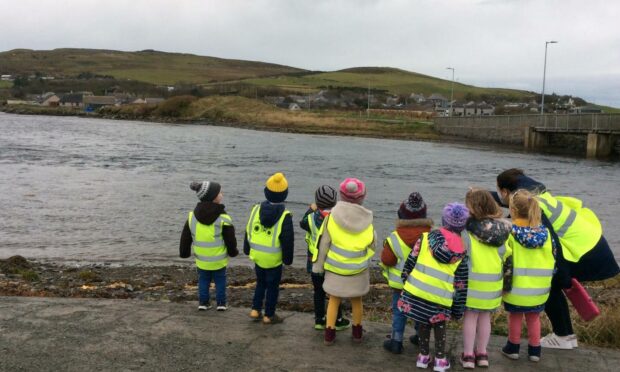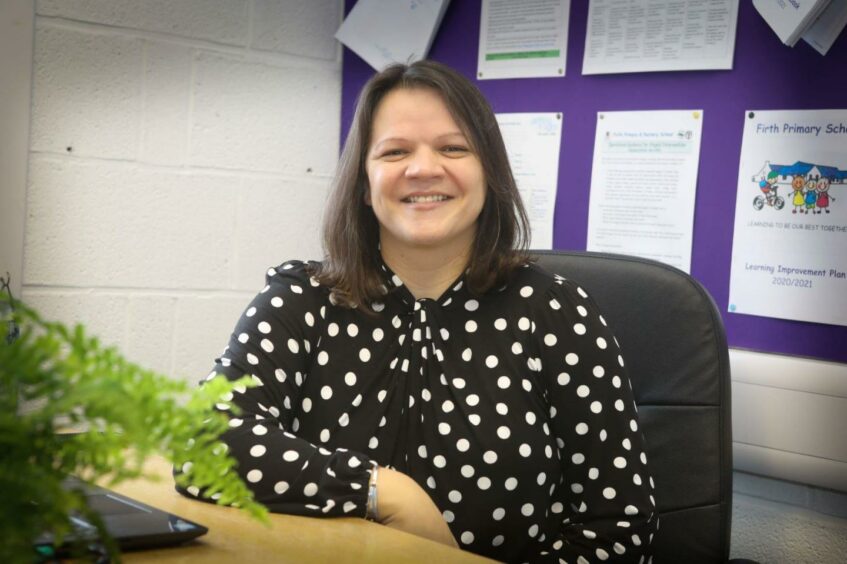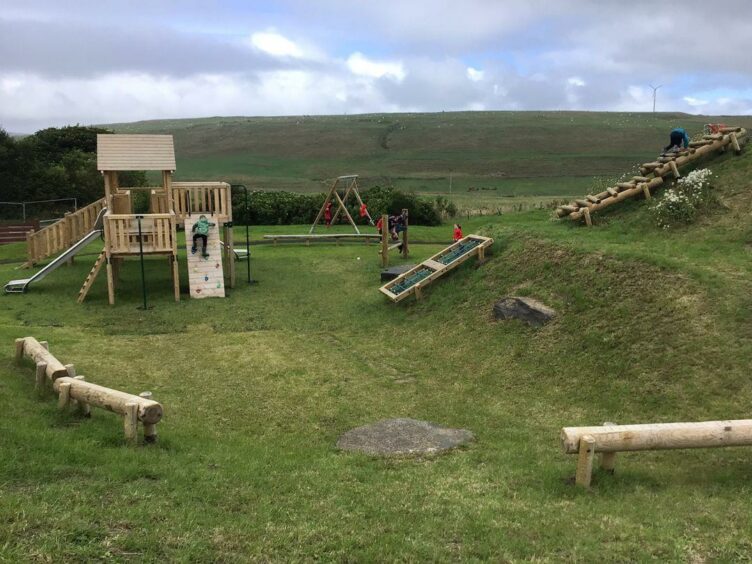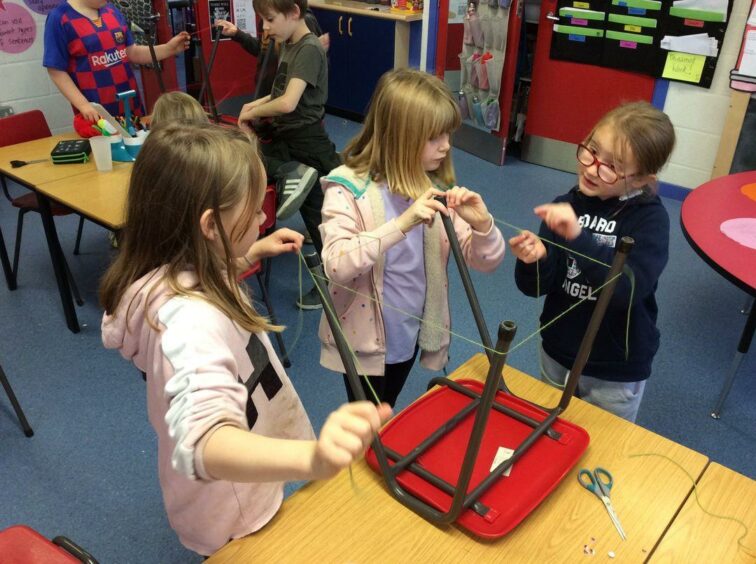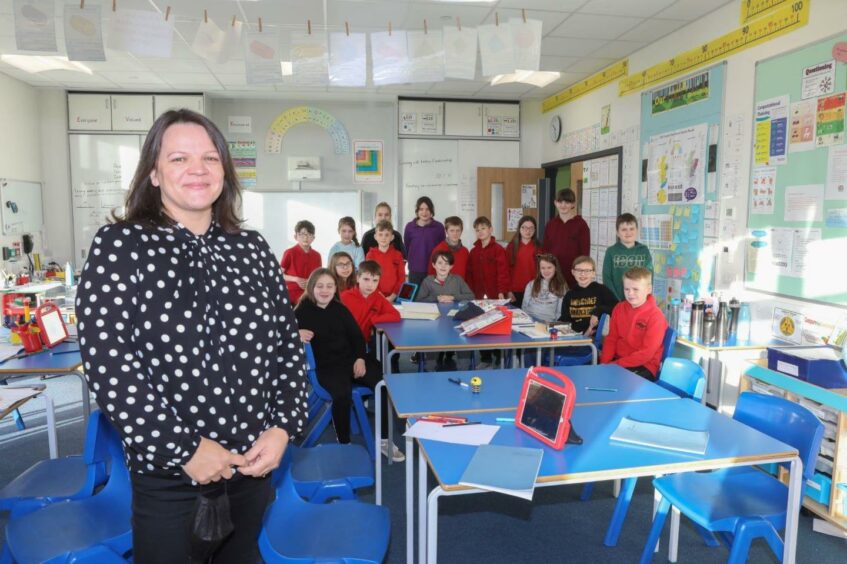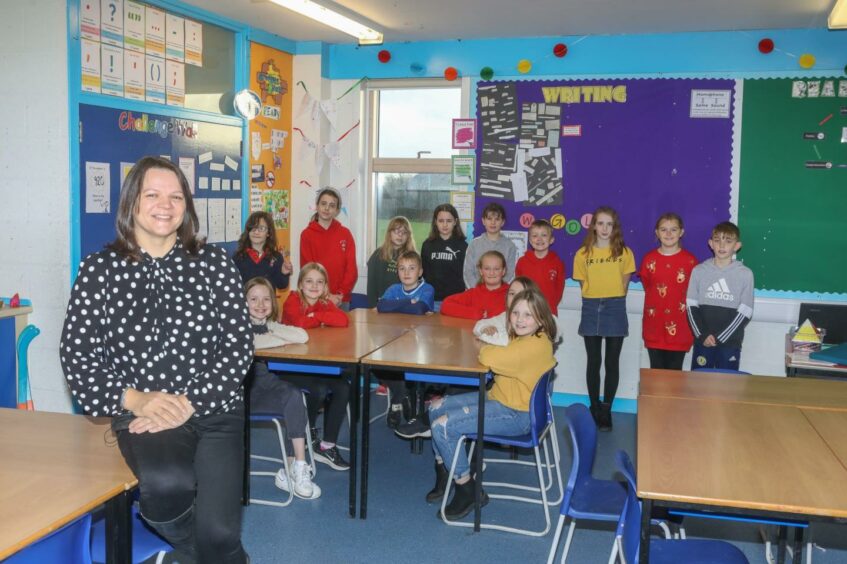Storm force winds, rampaging swans, and commuting by boat and plane.
School life in the Orkney Islands isn’t for the faint-hearted.
But when you’re a born and bred Orcadian, it’s all just part of the job.
Recently appointed as head teacher at Firth and Evie Schools, Emma Rendall has more than 20 years’ experience teaching on the islands, including at Dounby, Rousay and Westray.
Firth School has 90 pupils – four classes and a nursery. Meanwhile Evie School has 56 pupils – three classes and a nursery.
And as Mrs Rendall explained, a typical day in the life of a teacher on the islands isn’t something you’d find in the teacher training textbooks.
“Schools are in one sense the same everywhere,” she said.
“But for a start, weather and travel are different here. It’s very, very windy here.
“Every year we have extreme weather closures. We have to keep a close eye on the Met Office.
“You had Storm Arwen down in the north-east – that’s a regular occurrence up here!”
‘In the city you’d get the bus, here you get the boat’
The teacher training textbooks probably don’t mention pupils and staff commuting by boat and plane, either. But while most commute by foot, cycle, car and bus as elsewhere, others take a more dramatic route to the classroom.
“Some teachers commute to work by boat every day, we’ve had pupils doing that as well. I’ve done that myself before.
“It’s just how it is. In Edinburgh you’d get the bus, here you get the boat.
“Some commute by plane as well. There are a lot of islands here, with satellite classrooms.”
Despite having her work cut out managing two schools at the same time, Mrs Rendall still teaches at both.
“It’s just the nature of a smaller community,” she said. “We don’t have such a broad catchment of people who can do supply. So you do have to step in at the last minute and teach sometimes. I think most head teachers in Orkney have been doing that at the moment.
“But it does mean you’re very familiar with the children, where they’re at and what their needs are. I think it’s a good thing to do, but you do have to be very flexible and adaptable.”
Fitting two schools into one day
So what does a typical day look like?
“On a typical day I’d arrive at Firth in the morning. I speak to all the class teachers and make sure everyone is okay with what they’re doing.
“I usually have a lot of emails so I’ll do that and take care of all the communications and admin.”
She then gets in the car for the 15-minute journey north through the islands’ mainland to Evie.
Fittingly, she passes Norseman Village on the way – Mrs Rendall speaks passable Norwegian having spent time at Voss Folk High School in Norway.
“I usually try and get there for lunchtime so I can catch up with everyone. After school there’ll sometimes be a staff meeting or a parent council meeting.”
Dolphins and crash-landing swans
So far, so good. But as Mrs Rendall pointed out, the unexpected does happen.
“The other week, I arrived at the car park at Firth and this family of swans came flying over the bridge which the kids walk to school over.
“One swan hit the side of the bridge and got stuck on the walkway – right in the middle of where the children walk to school.
“A fully-grown swan is quite dangerous, it can break your leg if it attacks you.
“So we had to phone the SSPCA to come and remove it.”
Excitement over? Not in Orkney.
“As we were doing that, we saw a dolphin swimming just under the bridge.
“So we had a dolphin and swans crash landing all on the one day.
“Those are the kind of things that can happen here!”
‘A bit different from the norm’
She added: “Things do happen here which are perhaps a bit different from the norm. You do have to be prepared for anything.
“That is the most challenging part of the day, when something unexpected happens, or if something goes wrong. Particularly if something happens at one of the schools and I’m at the other one. That’s tricky.
“Sometimes you just have to leave what you’re doing and get in the car. Our staff are very good problem solvers, because although I’m always contactable, I can’t always be there. There’s a strong team here which supports me.”
Storm Arwen wreaked havoc across the north-east, with many schools closed and buildings damaged.
The storm was a once-in-a-lifetime event for some, but not for those living across the Pentland Firth.
“We get very strong winds in Orkney,” said Mrs Rendall. “We’re quite used to that.”
Storm closures are a regular occurrence on the islands, and Storm Arwen was no different.
“We had to close the school during Storm Arwen, and we had to form a human chain to get the kids on the bus because otherwise they’d have blown away!”
‘We went through turmoil’: Covid hits
One thing, of course, was as unique and unexpected in Orkney as it was everywhere. The pandemic.
“When the pandemic hit in 2020, it had a massive impact on everyone.
“The fact the school doors closed was a huge reality check. Suddenly the school community was thrown in a completely new direction.
“We did go through turmoil. The value of the school and its stability for the children and their learning was made very clear. The responsibility for the schools to get it right for every child in the face of adversity was huge.
“The council provided digital technology to families who needed it, and the staff in the school committed to upskill overnight to provide a digital connection, which was outstanding.
“The families were also proactive and got on board. We had classes with live-streamed learning and teaching where 100% of pupils attended, half in school and half at home.
“It was an amazing achievement by everyone involved.”
A special job: ‘Good sense of humour a must!’
In many respects, teaching children is a special job.
You’re not their parent, you’re not their friend, but you do spend a lot of time with them and share in their development.
“That’s the best part of the job, the children,” said Mrs Rendall. “Building relationships with them and seeing how they develop. And sharing that with staff and parents.
“I think kids respect fairness. They like it when you’re fair but firm.
“They appreciate the fact that although we expect a lot of them, we’re there to support them.
“It’s important to speak to kids, communication is key. That’s how you build those relationships.
“You’re the adult, you’re in charge, but you can be flexible within that.
“At the end of the day you’re there to support them, and I think they know that.
“You do have to have a sense of humour and fun though – that always helps!
“I think with everything you do in school, you have to try and make it fun – interesting and fun.”
She added: “I wouldn’t say I feel relief when the final bell goes, because I enjoy what I do.
“It’s more a satisfaction that you’ve got to the end of the day without anything going wrong, because like in any job, that can happen.”
More from the Schools and Family team
Councils refuse to use controversial sex survey in schools
The P&J investigates: Why are other countries’ school pupils outperforming ours?
Are young people turning to faith? Teens more likely to believe in God
